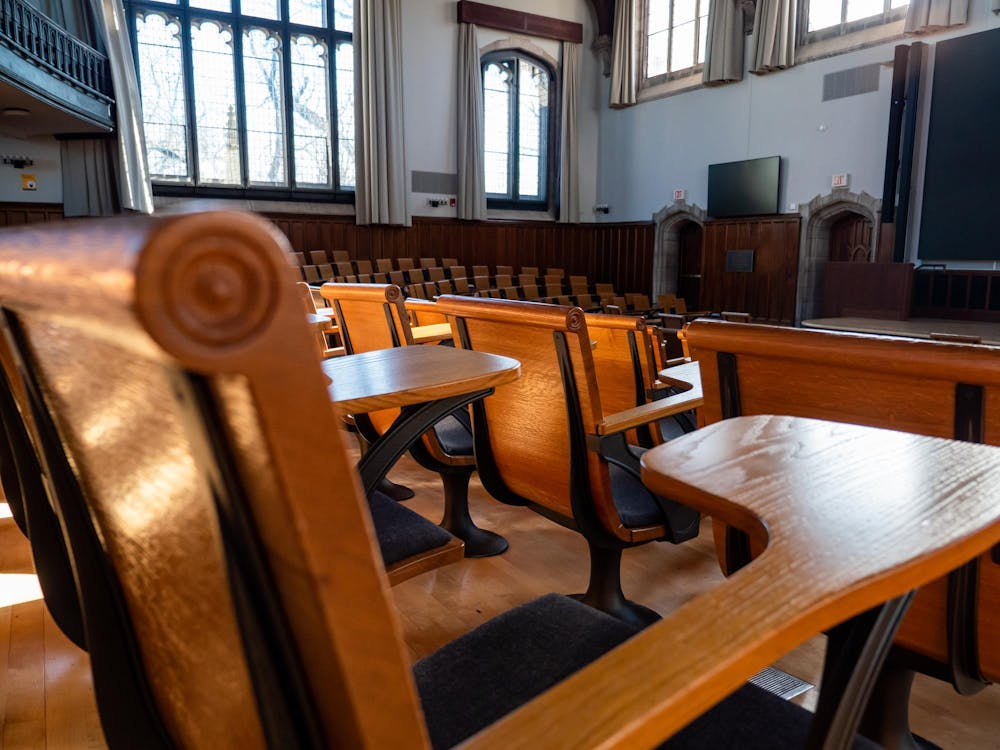Last month, undergraduates received their final e-mail from Spencer Merriweather '00, the outgoing president of the Undergraduate Student Government. Reflecting on his tenure as USG president, Merriweather admitted that "while we USG folk might like to think that we're all totally lovable, future 'real' officeholders that are indispensible [sic] to this campus, most of us are well aware that many of you simply think we're . . . well . . . tools."
Now, while people who have met Merriweather can attest to the fact that he is not your average student-government type, he's right that most people see student government as something of a joke.
And frankly, it is a joke. What does the USG do?
Besides maintaining the Student Course Guide, the USG performs a number of minor services like arranging shuttles and student discounts, things the University could do on its own. Letting the USG take charge makes the officers feel important, which is, after all, why they run for office in the first place.
Maybe that's too harsh. USG officers donate more time than most of us would to burning issues like "coordinating morning study breaks" — really, this is listed as an official USG duty on its Website. Perhaps we're better off leaving the trivial things to people who are honored by the title and the responsibility.
I don't think so. Maybe this would have been the best option before Dormnet, but student government has clearly lost its edge in legislative efficiency. While it had been simpler for Princeton students to elect officers than to use paper ballots to vote on each issue, we can now take advantage of online voting. By using the Internet to extend the decision-making process into dormitories and computer clusters, we can abolish the USG in favor of an online democracy.
While the motivation behind representative government is to shield "the masses" from issues that are too complicated or sophisticated for them to understand, this purpose doesn't apply here. It's safe to say that Princeton students are more than capable of understanding issues such as whether to extend late lunch hours or to push for more financial aid.
In the meantime, an online student government (OSG) would make governing more efficient and more democratic. Students could debate and lobby over issues via newsgroups and e-mail, and a broader range of students could vote on questions that might affect them. This forum would attract ideas from a better cross section of the student body than does the handful of ambitious elected officers. Instead of reading dry minutes of USG meetings, President Shapiro and the trustees could read transcripts of online debates.

How could the OSG perform all the vital roles that the USG now serves? It would use the same process the USG does — work via committee. Volunteers could staff the committees, or we could set up an online committee election process. That way, we'd get to keep the Student Course Guide running, and we could all vote on the arbitrary appointments to official University panels. These committees could set up projects and lobby for financial aid according to what the students decide through the discussion groups and referenda.
Online student democracy would give Princeton an opportunity to show itself as being progressive and technologically advanced. President Shapiro could give a nice statement about technology improving student life, and a professor from the politics department could comment on the implications of voting technology for democracy in the United States.
But undeniably, the biggest benefit that we as Princeton undergraduates would receive would be the disappearance of student campaigns, campaign signs and campaign rhetoric. It seems silly to pretend that the USG president wields great power, or that one president can be much different than any other. Let's take the power away from the USG crowd. It would be progressive, it would be democratic — and besides — it would just be fun to take our politicians-in-training down a notch. Joe Dague is a politics major from Carlisle, Pa. He can be reached at joedague@princeton.edu.








